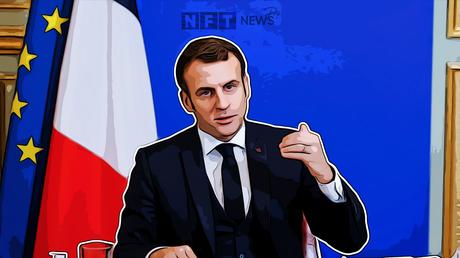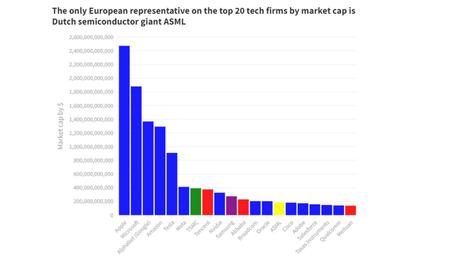
Businesses, investors, and people with skills in Europe all want to get on the metaverse hype train. Even the most powerful people in politics are making moves or at least making statements.
Emmanuel Macron, the president of France, wants to build “a European metaverse” to compete with tech giants in the US and China. Margrethe Vestager, who is in charge of digital issues for the EU, is thinking about new rules to stop unfair competition. But their goals are still a long way from coming true.
“The reality is there is no European big tech player of relevance in that whole metaverse future,” says Rolf Illenberger, the cofounder of Munich’s VRdirect, a virtual reality platform for enterprises. “It’s being defined by US and Asian players. Those are the two regions where this technology is going to develop.”
In the US, tech giants like Meta, Microsoft, and Apple are likely to take the lead, and Roblox and Decentraland are already popular proto-metaverse platforms.
Asia is home to their biggest competitors around the world. Bytedance, which owns TikTok and VR hardware giant Pico, is the strongest competitor, but Huawei, Tencent, and the Sandbox virtual world are also getting closer.
Europe, on the other hand, is mostly made up of niche operators and new businesses. Varjo, based in Finland, makes high-end headsets, and Ready Player Me, based in Estonia, is a cross-game avatar platform that just raised $56 million in a round of funding led by VC giant Andreessen Horowitz.
Jake Stott, the CEO of Web3 and Hype, an ad agency for the metaverse, is also hopeful that Europe’s well-known fintech sector can produce payment providers for the future. He does admit, though, that they face a lot of problems.
“Historically, European startups have lagged behind their US and Asian counterparts when it comes to producing unicorns,” he says. “Europe also trails behind the US in terms of venture capital raised. This is perhaps one of the areas where government support can help the continent’s fledgling metaverse ecosystem — by removing barriers to growth and creating incentives for VCs.”
Europe’s financial issue for the metaverse

Petri Rajahalme has his own ideas for how to make up the money. The Finnish businessman and his business partner, Dave Hayes, just started FOV Ventures. It is the first venture capital firm in Europe that focuses on early-stage metaverse companies. In March, the two of them announced a €25 million fund for pre-seed or seed-stage startups.
“We’re not lacking in talent, that’s for sure,” says Rajalhlme. “If you look at historical M&A, a lot of the companies that US [businesses] have snagged up are talent coming from Europe… The big question is how do you keep that talent in Europe?”
Talented people often go where they can make the most money. Finland, for example, has a free, high-quality education system, but its graduates don’t earn as much as those in Silicon Valley.
EU grants can help with scaling, but it takes a long time to apply for them and they don’t give out much money. FOV Ventures likes to keep talented people in Europe by giving them early-stage funding and advice on how to go to market.

An “edge network” of professionals from well-known players like Meta and Decentraland is a key part of the strategy. These experts can give you money and help you figure out how to work with big platforms.
Rajahalme also wants European investors to work together to compete with US resources.
“As VCs, we should be very collaborative here within Europe to share knowledge, deal flows, and insights — and also help at the grassroots level,” he says. “This is a big wave, but it’s a wave that’s just starting up and we have to get more and more people involved.”
Rajahalme has been investing in this trend since 2016, although he acknowledges that the metaverse only became widely known after Facebook changed its name to Meta.
That doesn’t mean that most people now know what the metaverse is.
In fact, the vagueness of the idea is both a problem and an opportunity.
Construction of the unknown
Members of both the European Commission and the European Parliament have said that the metaverse needs to be regulated. But there is one problem: they don’t really know what they’re regulating yet.
“As a legislator, we have now to think about how we can regulate something [that] is not there, or [that] is existing already but in a smaller dimension,” said MEP Axel Voss at a recent roundtable.
Definitions of the metaverse abound. Neal Stephenson, who coined the term in his 1992 novel Snow Crash, describes the real-life version as a “3D internet.”
Mark Zuckerberg, meanwhile, envisions “a virtual environment where you can be present with people in digital spaces” and “an embodied internet that you’re inside of rather than just looking at.
Rajahalme prefers the description given by fellow investor Matthew Ball:
“A massively scaled and interoperable network of real-time rendered 3D virtual worlds that can be experienced synchronously and persistently by an effectively unlimited number of users with an individual sense of presence, and with continuity of data, such as identity, history, entitlements, objects, communications, and payments.”
If you believe in Meta , the metaverse will enable seamless transitions between immersive virtual environments for business, learning, recreation, and essentially any other facet of our real life.
This big picture has certain parts that are already in place. Virtual worlds are a hallmark of online gaming, but users can also access VR vacations, immersive workspaces, augmented reality training simulations, and “industrial metaverses.”
The many European ecosystems can benefit from this variety of applications. For instance, the Nordic region can benefit from its thriving gaming industry, and Germany’s industrial economy offers good prospects for B2B services in the metaverse.
Critics, on the other hand, say that many “metaverse” vendors are just reselling old technologies with a new buzzword. Their separate uses are also not very well connected. Any attempt to make platforms work together will have a lot of design problems.
Illenberger, who started VRdirect, is still not sure that the metaverse will be decentralized. He thinks that the big tech companies in China and the US will still control access to the most important platforms.
“It’s going to be Meta, it’s going to be Apple, it’s going to be Bytedance — they’re going to control the ecosystem,” he says. “If you’re an app developer, you could develop an app for a Varjo, but your target audience will be [tiny]. So what you’re going to do is develop apps for Meta and Apple.”
Now, these future rulers of the metaverse are in the sights of EU lawmakers, who say that strong data protection and antitrust laws make a company more competitive.
Not everyone agrees.
making guidelines
Some investors, developers, and businesspeople in the metaverse are concerned that EU legislation stifles innovation.
Rajahalme, the founder of FOV Ventures, tells a story about a panel discussion about how AI is changing in the US and China. Representatives from the EU who were there said that their goal was to become the best at regulating AI.
“That’s like if when you started manufacturing cars, the Europeans said we want to be the best at making stop signs,” he jokes.
Illenberger’s company creates custom virtual reality (VR) experiences for businesses. He has seen what happens when rules are too strict.
One problem came up because VR headsets use cameras that look outward to see what’s around them. So, they can easily break EU rules about getting permission from anyone who could be accidentally filmed at work.
Because of these risks, big companies like Siemens have set up VR rooms that make it harder for people to break the rules. Still, some businesses find these facilities inconvenient and others can’t afford them.
“It’s a nightmare to even use metaverse technologies in compliance with European data privacy laws,” he says. “You have to film your environment in order for the device to work.”
The reality of a European metaverse
Even though European companies can play important roles in the metaverse, Macron’s hope that they can compete with the biggest tech companies in the world is unrealistic.
Instead of fighting the companies that are already there, European companies might do better if they worked with them. For example, VRdirect has made a business out of helping people with headsets made by Meta, Pico, and HTC.
Illenberger says that the fragmented market offers opportunities for this kind of interoperability.
He’s also sure that strict EU rules will help his business because companies will hire him instead of Silicon Valley companies that don’t care much about the rules.
“To some extent, this is a competitive advantage for us,” he says. “But in terms of Europe as a region versus the US and Asia, it’s a big roadblock.’
Leave this field empty if you're human: